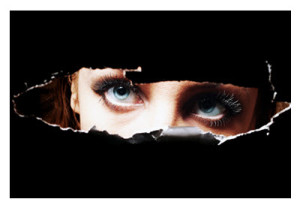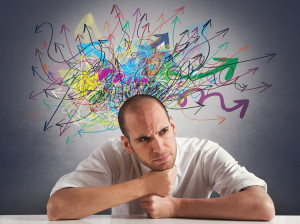Privacy is dead. Old concepts of a right to that privacy, if not completely lifeless, are gasping for breath.
 Or so it seems to plenty of us.
Or so it seems to plenty of us.
Between video surveillance on city streets, spy programs infiltrating our computers, and hackers going after phones — all very Big Brother, with a dose of Criminal Creeper — who wouldn’t have the feeling there’s no place we aren’t watched, judged and vulnerable?
Some of this intrusiveness we’ve come to accept. We rationalize that it’s an outcome of our not so Brave New World, post 9/11.
At the same time, some insist we can choose to conduct our lives in such a way as to retain greater privacy. Those who take this stance place the onus on the individual to secure a small, safe “sacred” space for oneself.
Tracing the Digital Footprint
But here’s the rub. Ever tried staying off the Internet entirely? No email, no purchases, no feeds, no logins?
That hardly seems likely, and it’s increasingly difficult. Every business, service provider and merchant, from banks to physicians and dating apps to government agencies, pressures us to interact online, and frequently requires highly sensitive or personal information.
It’s a Hacker’s Heaven, don’t you think?
Audit our digital exposure?
Sure, we can do that. Even a modest exercise of ye olde Think Before You Speak is a good first step, eking out a few moments consideration to what we say, to whom, and where we do our exuberant spilling and flashing — keeping in mind the importance of reputation.
But that requires paying attention, fewer distractions and interruptions competing for our time, more time. It also requires maturity.
What to Say? And How Much?
 I recall meeting someone five years ago who had no digital footprint whatsoever. It was as if he was a fiction, and it felt strange. I realize that only a few years prior to that I would have seen nothing unusual in his absence of Internet or social media presence.
I recall meeting someone five years ago who had no digital footprint whatsoever. It was as if he was a fiction, and it felt strange. I realize that only a few years prior to that I would have seen nothing unusual in his absence of Internet or social media presence.
My own fine line to navigate, as an online writer, when it comes to sharing in a public space?
Walking that line can be a challenge. Communication is more amped up, more widespread, and more insidious than ever. More confusing than ever, too, as we’re so preoccupied with getting a word in (on the visual, video or verbal channel of the hour), that we don’t necessarily factor “nuance” into our messaging.
Remember nuance?
Instead, we’re concerned with speed and “relevance,” often to the detriment of accuracy and intention.
Sometimes I’m convinced I say too much (despite efforts to be circumspect). Sometimes I feel that I’d like to elaborate (but I hold my virtual tongue). We know that specifics in storytelling bring narratives to life, but TMI is a pervasive problem for all of us as we blur the boundaries of public and private life, as individuals and as a society.
By way of example, during the years that I was writing about my sons, if I had any hesitation about their comfort with what I was saying, I checked with them.
Living Out Loud… Selectively
If we earn our keep by “living out loud,” or we enjoy the camaraderie and ease of putting opinions, personal details, comings-and-goings, intellectual property, images, and video clips online, we might do well to remember that access by strangers is only a few clicks away.
Additionally, we need to respect the boundaries that others set (like tagging and use of images), and adults should understand the ways that what we say can be misinterpreted, misused, and otherwise taken out of context.
Now, while the old adage may propose that “there is no such thing as bad publicity,” I beg to differ. And many would agree with that perspective, recognizing it’s an issue not only of reputation but of emotional vulnerability, physical safety, and the ability to earn a living.
 Privacy is a practical matter as well as an emotional one, even if it has become more “elastic” in the past 10 years.
Privacy is a practical matter as well as an emotional one, even if it has become more “elastic” in the past 10 years.
I find myself wondering: Must we purchase a tasteful headstone for privacy rights, and carve out its millennial epitaph?
The REALLY Public Life
What about people who live their lives on the public stage? I’m not speaking of politicians here, because I believe we could make a case for their private actions reflecting critical issues of values and character. (Even here we have to admit there is a tremendous amount of gray area.)
Don’t we secretly, or not so secretly, enjoy peering into the personal lives of others if we can — especially celebrities?
As I consider the epidemic of “twitter wars” among celebrities, I marvel (and bemoan) that society has lost so much common sense as to shout and pout across the web in 140 characters.
We could make an excellent case for Think Before You Speak, or perhaps “all publicity is good publicity” is effectively at work in these instances. But I would also state that these public figures are distorting our views of acceptable communication.
Creepers, Cases, Technology
You may be aware of the case of Erin Andrews vs. the Nashville Marriott, an unsettling example of how easily today’s technology can exacerbate a breech of privacy. In the Andrews incident, a stalker took a video of her walking around naked in a hotel room. He did so through a peephole, and placed it on the Internet.
How creepy is that? How creepy are the 300 million views it got?
What about this news item regarding a sex tape made of Hulk Hogan, without his knowledge, and posted by Gawker?
Voyeurism + Greed + Internet = Automatic deterioration of privacy for any of us?
Now, the Kardashians may have used sex tape notoriety to their advantage. They may continue to open the kimono to a degree that suits a bottomless voyeuristic hunger, while lining their pockets. That, it seems to me, is their choice. I suppose you could chalk it up to supply and demand.
Regular People, Irregular Behavior
 What about sexting and nude shots exchanged between lovers? Where is the line between flirtation and bad judgment, or seductive play and putting oneself at risk?
What about sexting and nude shots exchanged between lovers? Where is the line between flirtation and bad judgment, or seductive play and putting oneself at risk?
“I’m nobody special,” you may be thinking. Or: “Everybody does it. Why not?”
My thoughts? If sexting puts pep in your step and a flame in your game — as long as communications remain private and between consenting adults — have at it!
But do they stay private? What happens when they don’t?
Sure, life is one big judgment call, but I worry for our teens and millennials, and I worry for us, the adults.
How CAN We Protect Our Privacy?
At the very least, let’s exercise a modicum of caution, stay off our phones and social media if we’re under the influence, and refrain from publishing every thought, location, schedule detail or selfie in what is ultimately a public forum, or a forwardable medium.
In other words, don’t forget about copy and paste, screen captures, and the ability to “share” almost anything.
As for an expectation of privacy, which most of us once had in our homes and likewise on our phones, this latter is a legal quagmire. This leads me in a roundabout way to the Apple encryption case, explained in The New York Times, as law enforcement seeks access to the San Bernardino terrorist’s smartphone. The broader issue in the debate — tightening encryption or providing a “back door” for exceptions, which could make hacking that much easier. Fortune addresses this topic as well.
Check out both articles. The issues are complex and the discussion is important.
You May Also Enjoy
A situation that relates to all of this is that of Leigh Anne Arthur. She is the South Carolina schoolteacher whose privacy was breached when a student accessed her phone during a few minute period when she was out of the room. The student found some very personal photos on the phone and then decided to shame her to the community by posting them online. The school district pressured her to resign, saying she endangered the students by allowing for the possibility of this happening by leaving her phone in the proximity of the students for the few minutes.
The teacher takes the position that she is the one who has been violated, and I agree. How is this any different from leaving her purse unattended? I would imagine there would be widespread indignation if that part of her personal property had been breached, but when it is her phone that is accessed, a different standard is being applied, as if anyone and everyone has an automatic right to look at it. Common sense about respect, privacy and property rights have gone out the window in this case.
Excellent example, Robert. I agree with your position completely.
Good Post D. You never seem to be at a loss for great topics! Just like everybody else, I had to learn what you can and cannot do on the internet. I remember thinking that I had made a big mistake ever getting involved with the internet, Social Media, Forums, Twitter, etc. However, as time went by, I realized that, (As you have stated) it is difficult in today’s world not to use the internet and I also realized that there are many good things about using the internet. One simply has to be extremely cautious and discreet.
If I could give one piece of advice that everyone should follow, it would be; Do NOT post on the internet after you have had a couple of drinks. You are going to write something that you would never write if you were “Stone Sober.” Been there, done that! (LOL) No different then being at a cocktail party and letting a couple of drinks loosen your tongue! Better safe than sorry.
That’s so relevant, D.A.
I think we need a healthy balance of people understanding the consequences of their acts for themselves and for others + legislation to make privacy breaches chargeable. It would be totes adorbs if we could keep anything 1984-ish out of the process. Common sense is rare these days, non?
And I wonder, have you read Violet Blue’s The Smart Girl’s Guide To Privacy? She is in tech, and I found her advice pretty sound.
(I’ve reviewed it a gazillion months ago here http://beautycalypse.com/2014/07/03/bookshelf-monthly-july-wise-hot-and-healthy/)